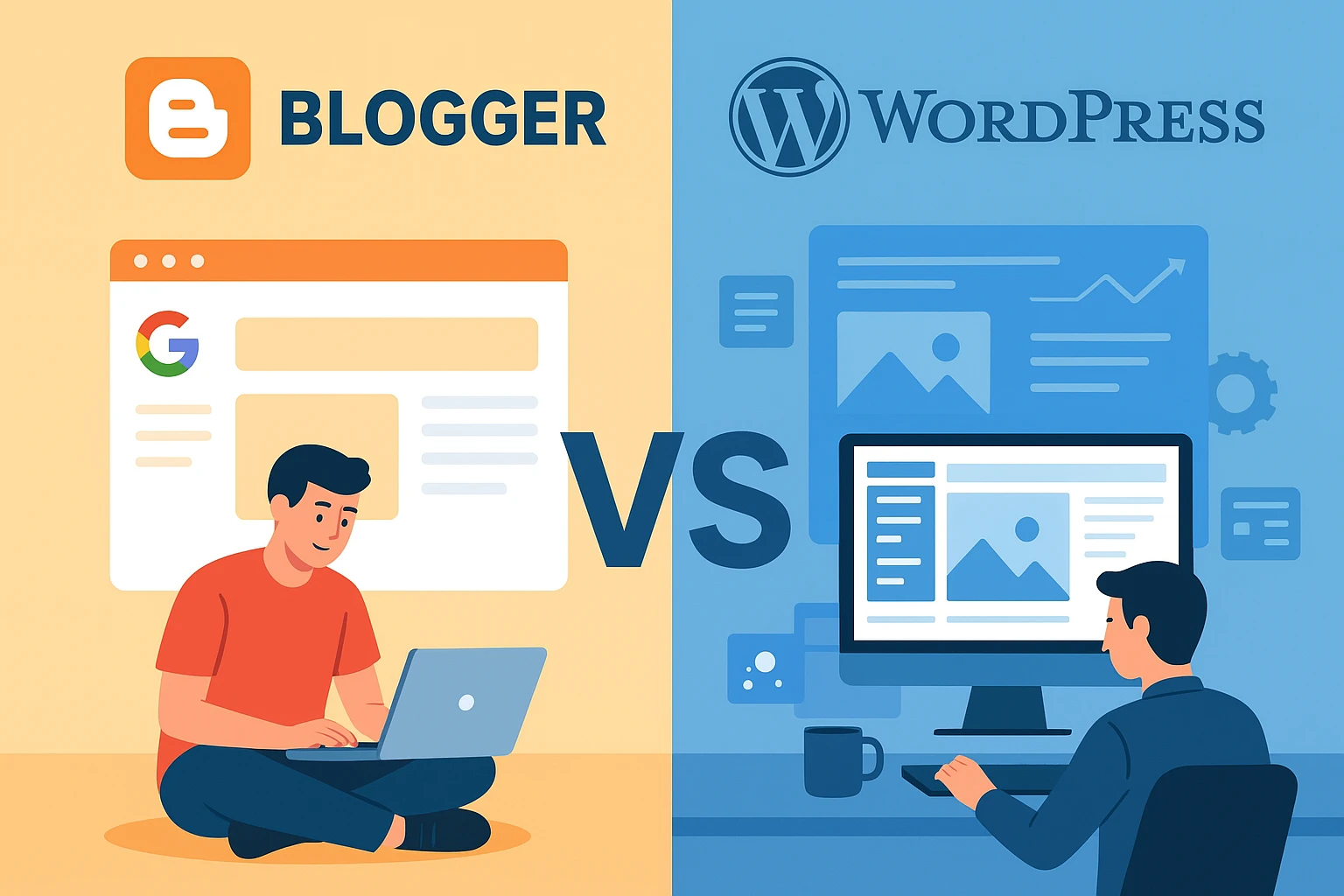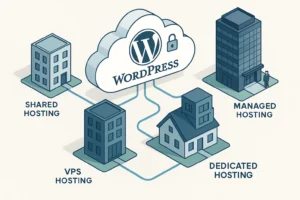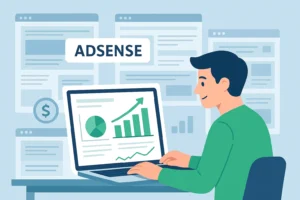Starting a blog is one of the best ways to share your ideas, build a personal brand, or even create a source of income. But before writing your first post, you’ll face an important decision: which the Best blogging platform should you choose? Among the most popular options, Blogger (by Google) and WordPress (the world’s most widely used CMS) stand out.
Both platforms have strengths and weaknesses, and the right choice depends on your goals, technical comfort level, and future plans. In this article, we’ll compare Blogger vs WordPress in detail to help you decide which platform suits you best.
1. The Best Blogging PlatformOverview of Blogger and WordPress
Blogger
Blogger is a free blogging service by Google, launched in 1999 and acquired by Google in 2003. It’s a simple platform designed for hobby bloggers and beginners. Since it’s tied to your Google account, starting a blog is quick and hassle-free. Your blog gets a subdomain (like yourname.blogspot.com) unless you purchase a custom domain.
Who it’s best for: Beginners who want to blog casually without worrying about hosting, security, or technical setup.
WordPress
WordPress comes in two versions:
- WordPress.com – A hosted solution with free and paid plans.
- WordPress.org – A self-hosted version where you install the WordPress software on your own hosting provider.
For this comparison, we’ll focus on WordPress.org, since it offers full control, customization, and is the most common choice for professional bloggers and businesses.
Who it’s best for: Bloggers, entrepreneurs, and businesses who want full ownership, scalability, and monetization opportunities.
2. Ease of Use
Blogger
- Extremely beginner-friendly.
- You only need a Google account to start.
- Simple dashboard with limited features.
- Easy to publish posts and change basic templates.
Best for: People who don’t want to deal with technical tasks.
WordPress
- Slightly more complex to set up (you’ll need hosting and domain).
- Thousands of themes and plugins can be overwhelming at first.
- Once learned, it offers far more flexibility.
Best for: Users willing to invest some time in learning for long-term benefits.
3. Design and Customization
Blogger
- Offers a limited set of templates.
- You can edit HTML/CSS for customization, but options are basic compared to WordPress.
- Less freedom to create a unique brand identity.
WordPress
- Thousands of free and premium themes.
- Unlimited customization with plugins, widgets, and coding.
- Can create any type of website (blog, portfolio, eCommerce, news portal).
Winner: WordPress, for its unmatched flexibility.
4. Ownership and Control
Blogger
- Owned and controlled by Google.
- You don’t own the platform—Google can suspend or shut down your blog.
- Limited export options if you want to move to another platform.
WordPress
- 100% ownership—you control your site, content, and hosting.
- No risk of sudden shutdown.
- Easier to migrate or expand as your blog grows.
Winner: WordPress gives you true independence.
5. Monetization Options
Blogger
- Direct integration with Google AdSense.
- Limited third-party monetization opportunities.
- Fewer plugins or tools for digital products or memberships.
WordPress
- Supports AdSense, affiliate marketing, sponsored posts, digital products, memberships, and more.
- Plugins like WooCommerce allow you to sell anything online.
- More SEO and marketing tools to increase earnings.
Winner: WordPress, for broader monetization potential.
Read Also : Blogger Beginners tips
6. SEO Capabilities
Blogger
- Decent SEO features like meta tags and Google indexing.
- Limited control over advanced SEO practices.
WordPress
- Superior SEO customization with plugins like Yoast SEO or Rank Math.
- Full control over URLs, sitemaps, image optimization, and more.
- Better suited for long-term ranking and organic growth.
Winner: WordPress, especially for serious bloggers.
7. Security and Maintenance
Blogger
- Google handles hosting and security.
- You don’t need to worry about updates or hacking.
- But limited backup and recovery options.
WordPress
- Security depends on your hosting and plugins.
- Requires regular updates and backups.
- Strong security plugins available to protect your site.
Winner: Blogger for simplicity, WordPress for stronger protection if managed properly.
8. Cost Comparison
Blogger
- Completely free unless you buy a custom domain.
- Hosting is free with Google.
WordPress
- WordPress software is free, but you need hosting (₹2,000–₹5,000 per year on average).
- Premium themes and plugins may add extra costs.
- Overall more expensive but worth it for professional growth.
9. Support and Community
Blogger
- Limited support.
- Some community forums, but not very active.
WordPress
- Huge global community.
- Detailed documentation, tutorials, and forums.
- Dedicated support from hosting companies.
Winner: WordPress, with a stronger ecosystem.
10. Which Should You Choose?
- Choose Blogger if:
- You’re a beginner testing the waters.
- You want a free, no-maintenance platform.
- Blogging is just a hobby and not a business plan.
- Choose WordPress if:
- You want full control and ownership of your content.
- You’re serious about building a professional blog or business website.
- You want to monetize, grow, and customize freely.
Final Verdict
If you’re blogging just for fun, Blogger is a simple, free, and beginner-friendly option. But if you want to build a long-term blogging career, grow your brand, or earn money, WordPress is the clear winner.
While Blogger may feel easier in the short run, WordPress offers scalability, flexibility, and control—qualities that matter most when your blog becomes more than a hobby.
In short: Start with Blogger if you’re experimenting, but switch to WordPress when you’re ready to get serious.
FAQ Section
1. Which is better for beginners, Blogger or WordPress?
Blogger is easier for beginners since it’s free, requires no setup, and is directly tied to your Google account. WordPress, while slightly complex at first, offers more flexibility and long-term growth.
2. Is Blogger completely free?
Yes. Blogger is free to use, and hosting is handled by Google. You only pay if you want a custom domain (like yourblog.com).
3. Can I make money from Blogger?
Yes, Blogger allows you to monetize through Google AdSense. However, WordPress offers more monetization options such as affiliate marketing, digital products, and memberships.
4. Do I own my content on Blogger?
No. Since Blogger is owned by Google, your blog could be removed if it violates their policies. With WordPress, you have full ownership of your content and website.
5. Is WordPress expensive compared to Blogger?
WordPress requires hosting and possibly premium themes or plugins, so it’s costlier than Blogger. However, the flexibility and monetization opportunities often justify the investment.
6. Can I move my blog from Blogger to WordPress later?
Yes, you can migrate from Blogger to WordPress. Many guides and plugins are available to make the transfer smooth, but some formatting may need manual adjustment.




Pingback: UPSC Recruitment Additional Government Advocate 2025